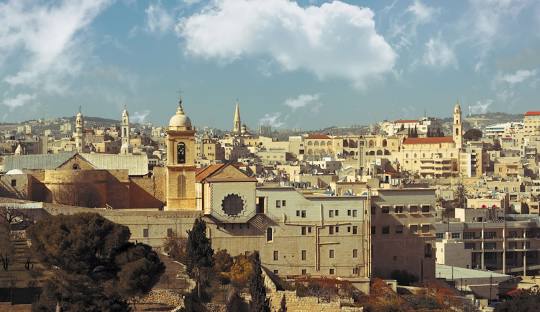Bethlehem, Palestine
🌟 Discover Bethlehem, Palestine: The Birthplace of Jesus
Bethlehem is a historic city with a rich religious and cultural heritage, attracting millions of visitors each year. Located in the West Bank, it is most famously known as the birthplace of Jesus Christ. A city deeply intertwined with Christianity, Bethlehem offers travelers a chance to explore significant religious landmarks, vibrant local culture, and the warm hospitality of its people.
🏛️ Top Attractions in Bethlehem:
1. Church of the Nativity ✝️
-
Significance:
The Church of the Nativity is one of the oldest continuously operating churches in the world and a UNESCO World Heritage site. Built on the spot where Jesus is believed to have been born, it is an essential pilgrimage site for Christians around the world. -
Experience:
Visitors can descend into the Grotto of the Nativity to view the sacred space where Jesus was born. The church's ancient mosaics, intricate architecture, and stunning religious art create an unforgettable spiritual experience.
2. Manger Square 🏙️
-
Significance:
Situated in the heart of Bethlehem, Manger Square is the city’s main gathering place. It is surrounded by historic buildings, cafes, and shops, making it a lively spot for tourists and locals alike. -
Experience:
The square hosts annual celebrations during Christmas, with crowds gathering to celebrate the birth of Jesus. The Palestinian flag waves proudly above, symbolizing national pride.
3. Milk Grotto 🕊️
-
Significance:
The Milk Grotto is a small cave where it is believed that Mary, after giving birth to Jesus, nursed him while fleeing to Egypt. It’s a sacred spot for many women seeking blessings for fertility and motherhood. -
Experience:
The grotto is known for its soft, white chalky stone, and the area exudes a serene and peaceful atmosphere. Visitors often leave small prayer notes in the grotto, adding to its mystique.
4. Shepherds' Field 🐑
-
Significance:
Shepherds' Field, located just outside of Bethlehem, is where angels are said to have announced the birth of Jesus to the shepherds. This area holds significant importance to Christianity. -
Experience:
The site features an ancient church and open fields, offering scenic views and a connection to the biblical narrative. It’s an ideal spot for reflection and learning about Bethlehem’s role in religious history.
5. Solomon’s Pools 💦
-
Significance:
A series of ancient water reservoirs built by King Solomon over 3,000 years ago to supply water to Bethlehem and the surrounding area. -
Experience:
Surrounded by lush greenery and hills, the Solomon Pools are a peaceful retreat for nature lovers and a fascinating site for those interested in ancient engineering and history.
🌿 Cultural Insights:
🏡 Explore Local Markets & Cuisine 🍽️
-
Bethlehem’s souks (markets) are filled with colorful stalls selling handmade crafts, olive wood carvings, and Palestinian embroidery. Here, visitors can purchase souvenirs and taste traditional Palestinian food like hummus, falafel, and knafeh.
🎨 Experience Palestinian Art and Culture 🖌️
-
Palestinian art is an essential part of Bethlehem’s identity. Visitors can visit local galleries showcasing modern Palestinian art, which reflects the people’s struggles, hopes, and dreams.
-
Palestinian folklore and music play an important role in Bethlehem's vibrant cultural scene, with local performances and festivals often taking place.
🧳 Plan Your Visit:
Bethlehem is accessible from Jerusalem, located about 10 kilometers south. The city is part of Area A under Palestinian control, meaning that travelers will need to pass through Israeli checkpoints to access the city.
🏞️ Why Visit Bethlehem?
-
Rich History & Spirituality: Experience one of the most historically significant cities in the world, the birthplace of Jesus Christ.
-
Cultural Vibrancy: Bethlehem offers a unique blend of ancient heritage and modern Palestinian culture.
-
Beautiful Scenery: From the Shepherds' Field to Solomon’s Pools, the natural beauty surrounding the city is captivating.


